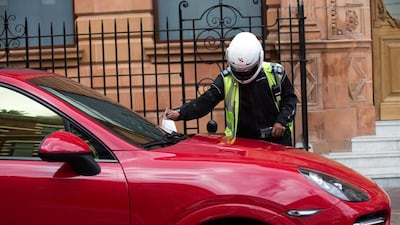Loud, pushy and causing a ruckus, the family of six made their way late to the boarding gate, carrying too many bags that were too big for carry-on luggage, and then stood there demanding an upgrade. They said they had illnesses, and were VIPs who should not travel in economy class.
I saw the other passengers’ eyes roll and mumble among themselves: “Those Arabs ...”
Unfortunately, there are many stereotypes about Arabs – and I truly hate to generalise because Arabs are as diverse as any other people – but some things stick for a reason.
Like being late for an appointment. Even I am guilty of this, no matter how hard I try to change this bad habit, because even being five minutes late is rude, and so is cancelling at the last minute. I laugh whenever a westerner says to me: “Is that an Inshallah yes or no?”
And some Arabs become more obnoxious when they travel. Every summer, wherever they go, Arabs make some kind of headline. Sometimes it is about the fancy cars they bring with them, or the way they dress in designer clothes from top to bottom, or the over extravagance they show with expensive parties and shopping lists that reach the tens of thousands of dollars.
This summer, it was a completely different kind of scandal. Social media has been busy the past week with reactions to shameful videos posted by GCC nationals of ducks they stole from a park, then tortured and killed before cooking them. How horrible!
There were also photos of the litter left behind by Arab tourists who had been smoking shisha in parks, and of Arabs dancing to loud folk songs on high-end streets in European cities. Europeans and other GCC nationals criticised this behaviour, and called it disgraceful. It even reached a point that there were demands in the Austrian parliament to reduce the number of visas granted to Saudi Arabian and Kuwaiti citizens.
Photoshopped images of ducks and geese wearing clothes have gone viral, with the caption: “Europe protects its ducks from Arabs by disguising them as humans.”
The Prague Post posted an article about Arabs responding to protests about their behaviour by cleaning their parks and their streets. It also reported: "Football pitches are to be leased so that the children of the Middle East visitors do not threaten people walking in the park by their playing football."
Just this past holiday, I was hit by a football that had been kicked by some Arab children playing at a resort in Dubai. There was a whole space where they could have played, but they chose to do it between people who were reading and trying to enjoy some peace and quiet on their recliners. They also kept kicking sand into guests’ drinks.
When I tried to tell them to move a bit further down, they snapped at me rudely and continued to do as they pleased. There were no parents in sight, just a pair of maids who looked as helpless as the rest of us. I would also see, say, a western couple sit with their children to build sandcastles, near loud Arab children, with no parents in sight, bullying their maid to carry more buckets of water to help them build their castles.
Thankfully, there are many Arab families who are vigilant about raising their children properly, and teach them to respect the places they visit and the people they meet. We don’t have to look further than ourselves to see that for something to change, we have to change too.
At a park in Dubai, a mother threw a whole lot of rubbish on the grass and was walking away when her daughter called out to her.
“Mama, don’t litter! You have to respect nature and its animals. A bird might confuse this plastic wire for a worm and die eating it,” said the youngster, who looked about 11.
The daughter and her little brother picked up all the rubbish and put it in the bin, which was just three steps away. I clapped and they smiled back.
There is hope for our future.
rghazal@thenational.ae
On Twitter:@Arabianmau

